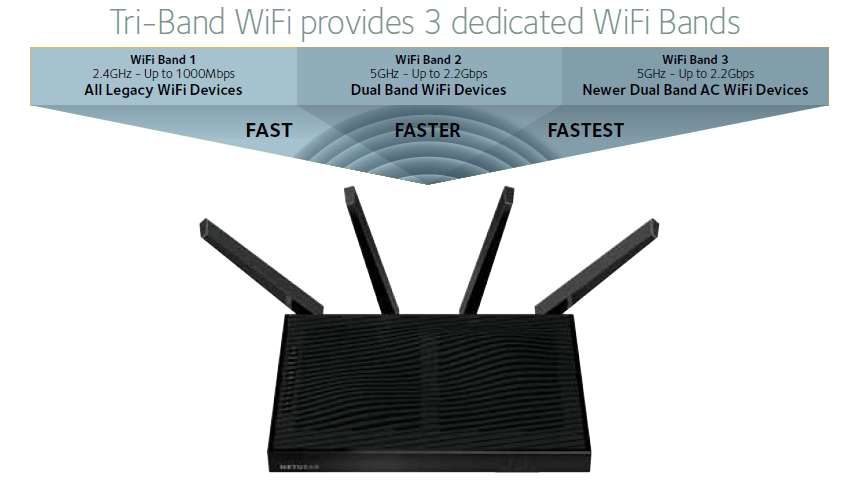Wireless Networking Guide – Which Kind of Router is Right for You?

With so many different options for wireless routers available out there today, it can be difficult to decide which networking hub is right for you and your home. While some offer blazing fast speeds for an equally high price, sometimes the answer isn’t always “more expensive is automatically better” when it comes to different factors like the broadband plan you pay for, the number of people that are connecting at any given time, and the specific applications you plan on using on the network.
So which router is a match made for you? Read on to find out.
How Much Should You Spend?
Like any technology product on the market, routers come in dozens of different flavors and models, all of which enter in at vastly different price points. For every iPhone 6S Plus with 128GB of space, there’s an iPhone 5C with 16GB, and for every Netgear Nighthawk X8 ($360 USD), there’s a Netgear R6250 ($99) that could do almost as good as a job for less than 1/3rd of the price depending on how you plan to use it.
Realistically, the amount you drop on your next router shouldn’t be based purely on the idea that “more expensive means better”, because it’s broken down on a case-by-case basis. Only use your home internet to do some light web browsing or check the news once or twice a day? The R6250 would be more than well-equipped enough to handle the job, and you’d even be able to throw in a little 1080p Netflix streaming into the mix without worry.
If you’re in a large house, need tons of range, and require the absolute lowest latency possible for that next fragging session in Battlefield 4, you should think about looking into the X8 simply because its large antennas, faster internal processor, and added features will ensure that you don’t drop a frame during that next clutch shootout. The amount you spend on your router shouldn’t depend so much on your budget, as it does the number of devices you need to support, what types of receivers they each have, and how many features they’re able to connect to in the first place.
Understanding Your Environment
One major issue that people find with certain routers is that with so many different devices connecting over different channels and wireless bands, the lines can quickly become bogged down. Not many consumers are aware of this, but often outdated devices (say an iPhone 4 or an older laptop) can actually slow down the speed of the other devices connected to a single wireless band, due to a phenomena known as “network congestion”.
For example, while the 5Ghz is better at achieving a stable connection at shorter ranges, not all mobile devices have receivers that are primed to take full advantage of everything it can do. Not only that, but if you aren’t careful about managing which devices are on which band, it can quickly end up that all the devices in your house are attached to the 2.4Ghz band (thus slowing it down), while the 5Ghz spectrum sits totally empty.

The D-Link AC3200 automatically organizes your connections for you, taking the guesswork out of the equation
Features like Smart Connect that you’ll find on D-Link’s new AC3200 router are a supposed remedy to this problem, automatically vetting each individual device for its distance from the router, the power of its receiver, and the applications it’s trying to use and splitting up the band traffic accordingly. This can also be done manually by tweaking your internet settings inside the router itself, though the process of getting everything configured properly can still be painstaking for anyone who doesn’t know what they’re doing from the outset.
Another important factor to keep in mind is that even if you do buy an expensive router, if you’re still on DSL or a low-end cable internet plan, the high-end routers really won’t do you as much good as you might hope. For example, the Ac3200 is rated to achieve speeds upwards of 1300Mbps on a single band, but if your broadband subscription only transmits up to 100Mbps in total, that’s only 1/15th of the router’s theoretical output, i.e – a whole lot of wasted money (and potential).
Whenever you go shopping for that next router, be sure that your internet connection is up to the task of handling what it can put out. If you’re attached to a slower plan, don’t spend more than you have to, and if you have fiber optic, you’ll need to go into the upper reaches of the price tier in order to get every drop of performance out of your network that you’re subscribed to.
So Which Kind of Router is Right for You?
Well, as you can see above: it all depends on how to plan to use it, and where.
If you live in a crowded apartment complex with lots of surrounding networking hubs, obviously snagging a router that can communicate on the 5Ghz spectrum is going to be a must-have. That said, many older mobile devices and laptops aren’t equipped to receive the 5Ghz signal, so it’s important to make sure that if you do intend on dropping a little extra coin on your hub to get the added functionality, that you can actually utilize it in the first place.
Most of the high-end routers that are being released in 2015 are primed to take advantage of new internet services like Google’s upcoming Fiber rollout (1Gbps up/down simultaneously), but even then it could be years before we see fiber optics in every major city around the country. This means that for the time being, you’re most likely going to be better off picking up a router that’s in the middle of the road as far as cost is concerned, with just enough power to keep your stream-happy family from waiting for the dreaded “buffering” symbol on Netflix, but isn’t so overkill that all you end up with is a giant eyesore of a networking hub that’s only good for half of the features it’s been installed with.
















